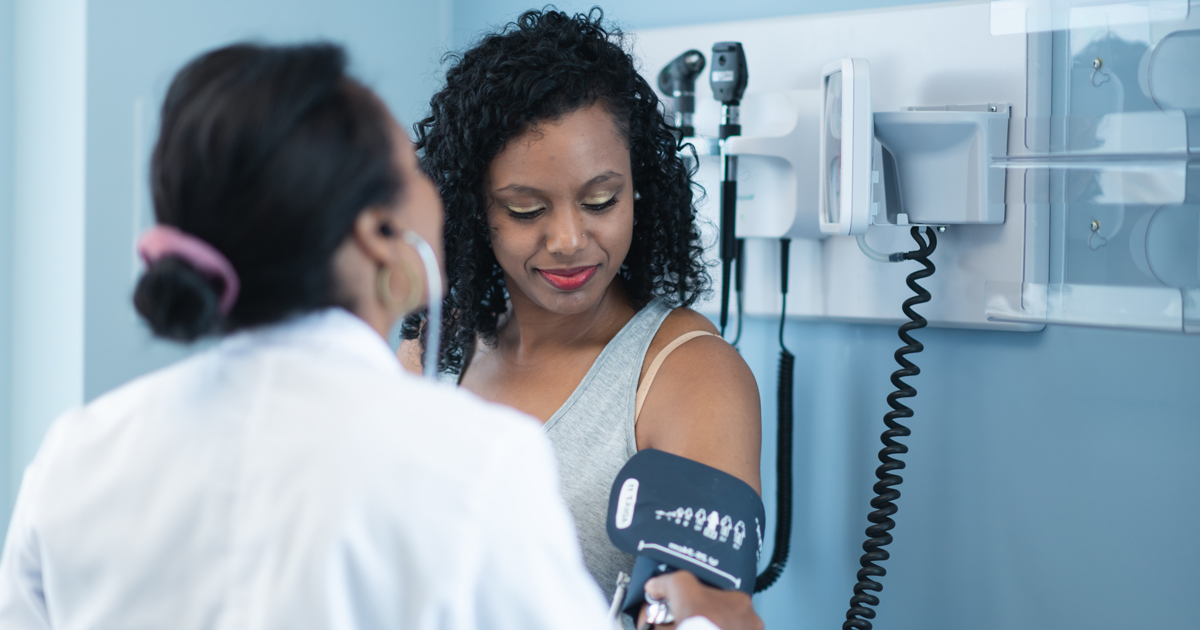Can COVID-19 cause high blood pressure? Plus 5 more hypertension questions

High blood pressure, also called hypertension, is incredibly common. About half of U.S. adults (47%) have high blood pressure. This puts them at risk for severe conditions like stroke or heart attack.
In most cases, the condition has no symptoms. So how can you know if you have high blood pressure?
"High blood pressure is often called the silent killer," says cardiologist Dan Anderson, MD, PhD. "The best way to know if you have high blood pressure is to get your blood pressure checked."
Here Dr. Anderson answers common questions about hypertension – and how you can fight it.
1. What is normal blood pressure?
Blood pressure is a measure of the pressure in your arteries. Arteries carry blood from your heart to the rest of your body.
The first number in a blood pressure reading is systolic blood pressure. The number describes when your heart beats and pushes blood out.
The second number is diastolic blood pressure – when your heart rests between beats and pressure in your arteries is its lowest.
- 120/80 – 120 is systolic, 80 is diastolic
A blood pressure of less than 120/80 mmHg is ideal. High blood pressure is defined as blood pressure over 130 mmHg.
Blood pressure levels:
- Ideal: less than 120/80 mmHg
- Elevated: 120/80 to 129/80 mmHg
- High: 130/80 mmHg or higher
- Hypertensive crisis: 180/120 mmHg or higher
If you or someone else has blood pressure levels above 180/120 mmHg with unusual symptoms like chest pain, call 911.
2. How is high blood pressure dangerous?
Left untreated, high blood pressure can cause a variety of health issues. High blood pressure puts you at risk for stroke, heart attack, heart failure, atrial fibrillation, vision problems and kidney failure.
"Healthy arteries are elastic. They stretch as they fill with blood so they can maintain pressure during and between heartbeats," explains Dr. Anderson. "When the arteries become inflexible, there's a huge gap between the high and low pressure. The heart squeezes create tremendous pressure."
"When you have a large gap between the upper number and lower number, we call that a wide pulse pressure," says Dr. Anderson.
3. Can high blood pressure cause headaches, dizziness or anxiety?
Yes, extremely high blood pressure can cause symptoms like dizziness, chest pain and anxiety. But you can also have high blood pressure without any symptoms.
"Hypertension itself doesn't have symptoms unless it becomes malignant. Malignant means it's so high you start to get headaches and chest pain," says Dr. Anderson. "For example, if your blood pressure is 210/100, you'll have immediate effects on your brain, heart and breathing."
The symptoms of extremely high blood pressure include:
- Headaches
- Dizziness
- Shortness of breath
- Mental confusion
- Feeling like a heart attack
- Anxiety
- Chest pain
4. Is high blood pressure an underlying condition for severe COVID-19?
It is possible hypertension can increase the likelihood of severe COVID-19. However, obesity, physical inactivity and heart conditions definitely increase the risk for severe COVID-19.
Find out how COVID-19 affects the circulatory system.
5. Is COVID-19 causing high blood pressure?
So far, research hasn't shown that COVID-19 causes higher blood pressure.
Someone seeing their doctor for COVID-19 may find out for the first time about their high blood pressure. "We often see this in medicine, where someone comes in with one medical problem, and we also identify a different medical problem in the same visit," says Dr. Anderson. "But the first problem doesn't necessarily cause the second."
Since you can have high blood pressure – yet not have symptoms – you may find out about your hypertension during a visit to the doctor for a different concern.
Find out why COVID-19 vaccines do not increase blood pressure.
6. Can high blood pressure be reversed?
Yes, there are two ways to lower high blood pressure: lifestyle changes and medications.
With lifestyle changes alone, you can drop your blood pressure numbers by 5% to 10%. A slight decrease in systolic blood pressure, as little as 3 to 5 mmHg, significantly affects the risk of stroke and heart attacks. Small changes can make a big difference in your health.
5 ways to reduce your blood pressure
- Eat whole foods: Increase fruits, vegetables, whole-grain foods, fish, nuts and legumes in your diet. The MIND diet can help you lower blood pressure and lose weight.
- Exercise: Working out keeps your blood flowing. Aim for 30 minutes a day, five days a week.
- Lower stress: Constant psychological pressure may damage artery walls. Use self-care strategies like long walks, baths, therapy, journaling or yoga to relieve stress.
- Quit smoking: Nicotine raises blood pressure and thickens the blood, increasing the amount of plaque buildup in the arteries. When you kick the habit, your stroke risk drops immediately. Our Nicotine Dependence Clinic can help you quit.
- Maintain a healthy weight: Losing as little as 10 pounds can have a large impact on your blood pressure.
You may need to manage blood pressure with medications. Our Heart and Vascular team can help. Using the latest technology, we can diagnose and manage common to complex heart conditions.
Call 800.922.0000 to make an appointment with a primary care provider, who can refer you to a heart specialist if needed.



